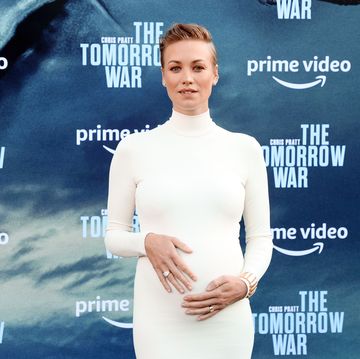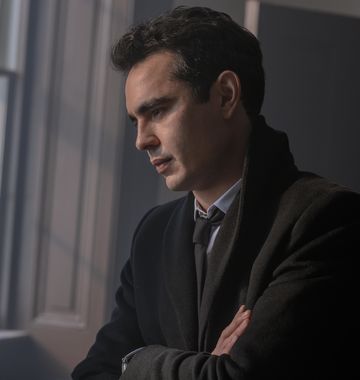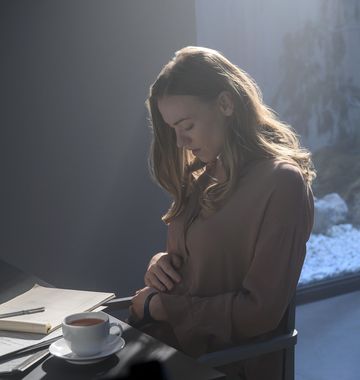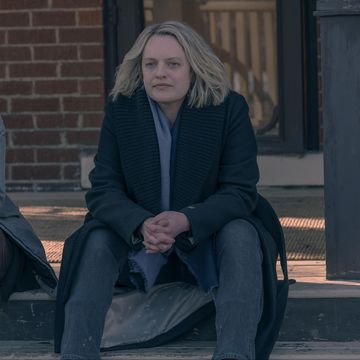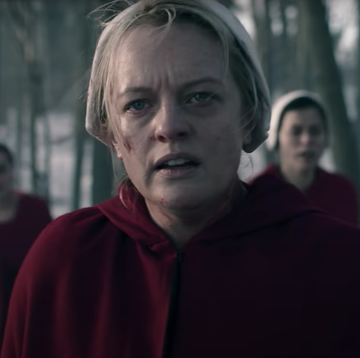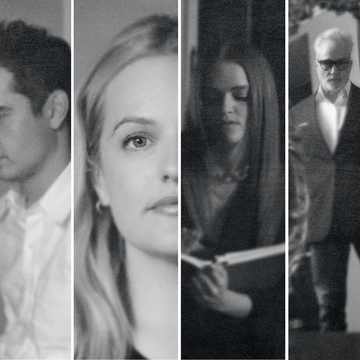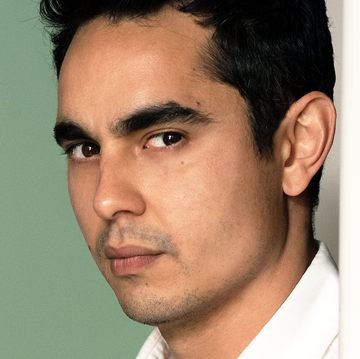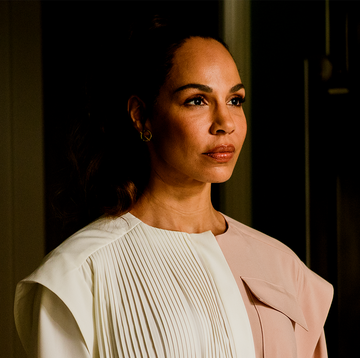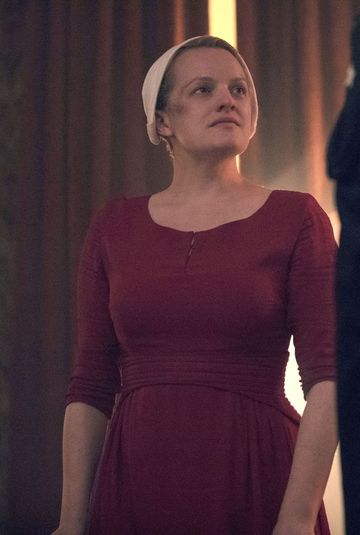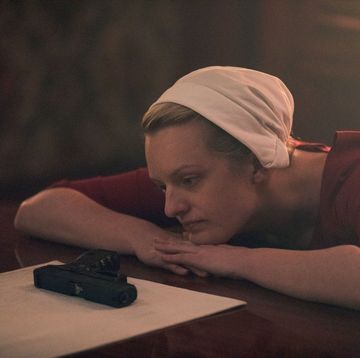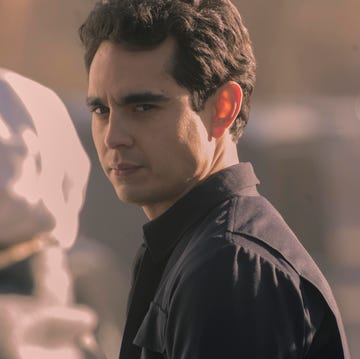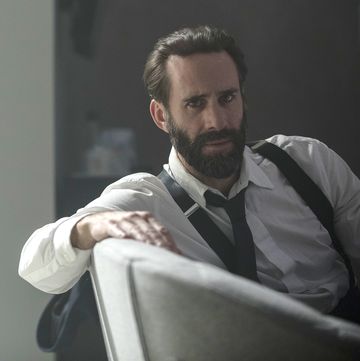As the third season of The Handmaid's Tale comes to a close, the dystopian drama is as challenging as ever. Yes, it's still unflinching in its depiction of mental and physical brutalization, but this has emboldened its Handmaids, Marthas, and various other allies to take part in cathartic acts of resistance. That's as close to a feel-good (or feel-slightly-less-bad) reprieve as the show is willing to venture in response to the relentless real-world news cycle.
Instead, what's made The Handmaid's Tale more challenging is the whole new palette of grays it's using to color the moral ambiguities of its characters. June embraces a newfound ruthlessness, more willing to turn a blind eye to collateral damage. Serena, complicit in the creation of Gilead's repressive regime, finds herself regretful of the cage she's built—afraid of bringing the child she considers her daughter back into that cage. Commander Lawrence, a bona fide war criminal, becomes a reluctant rebel for the sake of his mentally ill wife. "Wouldn't it be funny if you actually turned out to be a hero," June asks him, only half-mockingly.
No character has come to represent this dichotomy more than Ann Dowd's Aunt Lydia. Some of the most jarring moments in the series haven't been acts of cruelty, but her momentary acts of kindness. In the season's eighth episode, we're introduced to her life before Gilead, a confronting image of a doting schoolteacher looking to share all the love she has to give—whether with Noelle, a single parent to one of her students, or a rare romantic prospect after her failed marriage. Now, when Lydia gifts Janine a red eye patch or calls June a "good girl," we know we're glimpsing a profoundly broken, once-redeemable person.
But with the Waterfords in Canadian custody, the Lawrences' relationship closing in tragedy, and the season's big bad Commander Winslow merely incinerator ash, Aunt Lydia is the show's last oppressor standing. Her conflicted feelings haven't spelled her downfall—yet. Here, Dowd dissects Aunt Lydia's complex legacy, what she's learned from the young actors who play her Handmaids, and what the women of the Trump administration can learn from complicit women like Lydia.
This season, we finally got a glimpse of Aunt Lydia's pre-Gilead life. Is her backstory what you imagined it would be when you took the role?
[Showrunner] Bruce Miller told me early on that she was a school teacher. That opened up many, many doors. I could imagine her being a teacher with a very religious upbringing—a mother not very present, a father loving but stern. I myself was raised in a strong Catholic home. It was a very loving home, but one in which religion was very important, as was the Catholic church. I was taught by Catholic sisters. They were never cruel or violent, but they had an extremely strong work ethic, and it was their goal to make sure we did too. They wanted to teach us that you're no more important than anybody else, so when there's a job to be done, you do it to completion. As the writers developed Lydia's story, it felt really right that they would choose something involving heartbreak and loss.
Did you expect her personality would be so caring and tender? Or did you think she was going to be more of a schoolmarm, someone as rigid as present-day Aunt Lydia?
Oh, no, I thought she would be very gentle and loving. I think she adores children. There was shame in the way she was raised. She considers herself responsible for the death of her sister's baby, even though she was not. With Noelle and her son, she sees someone she could potentially help and protect, so she's allowed her walls to go down. My guess is that after this experience with Noelle, a lot of doors close inside her. She goes on to teach junior high, where she can get really strict because the students are teenagers.
June, Moira, and Emily’s backstories showed how women were slowly robbed of their autonomy. Serena's backstory showed how some women become trapped in their own complicity. Lydia’s backstory shows us how a woman looking for purpose was ripe to be radicalized by Gilead.
I think it was the perfect storm: Being raised religiously and believing strongly in it. She's deeply devoted to God, no question, and she believes life involves sacrifice—that it's all in service to God. Episodes like her failed marriage, like what we see in the backstory, it all catapulted her into those early meetings in church basements, talking about Gilead, saying, "I'm a teacher, I see the promise these children have, but I see they have no relationship to God. I hear the language they're using. They're dressing like whores. And now there are no babies being born, and the earth is a wrecked mess—all due to our disrespect of God." You bring all those things together and you get someone who was ready to take charge in the new world—the new world being Gilead.
Lydia's cruelty has always been in sharp contrast to those fleeting, surprising moments of empathy or tenderness toward the Handmaids. That dichotomy was fleshed out more in her flashbacks. Did you find that they illuminated her motivations?
I think she felt that she had failed personally after her marriage fell apart, and when you feel a failure in a personal relationship, you turn to others. You put that love somewhere. For her, it was her students. All of that love went right into her work. So I think her love of the Handmaids is genuine. Her intent has never been about being in power, unlike the Commanders and their Wives. Her goal was always to teach, to bring these girls into lives of meaning and respect that she believes can only come from a relationship with God.
When Aunt Lydia saw how the Handmaids in Washington, D.C., had their mouths pierced shut, she was clearly shaken. With enough experiences like that, do you think she would have a crisis of faith? Or do you think she’s devoted to Gilead until the end?
Well, that's a great question. I think it forces her to reevaluate her goals. The closing of the Handmaids' mouths is a disgrace to her. At first, she thinks, Oh, the veils are lovely, so respectful. But then, Wait a second, they're wearing them all the time. In Lydia's view, she wants to hear her Handmaids speak. God gave them those voices! She wants to see their transformation and hear from them about their growth. She wants to see the beautiful faces God has given them. She's not interested in shutting them down—she's interested in changing them. I think she realized that what they're doing in Washington is not what she wants for Gilead. Not for a minute. We'll see if that leads to a crisis of faith. We'll see.
I understand that you’ve become very close with the young actresses who play Aunt Lydia's Handmaids.
I adore them. They are beautiful, intelligent, talented young women. I'm the old one on-set, but they actually educate me in certain ways. Like the notion of being "woke," or what it means to clarify your pronouns. When you're young, you're fluent in today's issues. It's very helpful to someone like me to get a younger person's perspective. They've got their ear to the ground. My oldest son is 27, my daughter is 21, and my youngest son is 14. I need all the help I can get.
What's a time you learned something from them on-set?
For one, my son is African-American, and I want very much to understand from my perspective—a white person's perspective—more about black culture in a very personal way. I want to be sensitive to not just the obvious issues, but the more subtle effects of racism. While we were filming last season, there were stories about how Viggo Mortensen had used the N-word during a [Green Book] panel and was sharply criticized. Now, I've worked with him—he's a wonderful actor, and a sensitive and kind human being. I couldn't imagine that he would do anything with any intent to hurt or disrespect black culture. But he was educated in that respect, and he apologized. We were sitting around discussing it, and Maddie [Brewer] was saying that under no circumstances can you use the N-word. Even if you're amongst friends and you're talking about the N-word, it does not get spoken. I was surprised by that. I asked two of the actresses who are black, who play some of our Handmaids, "What does that feel like to hear that word? Not in a situation where someone is using it towards you, but just hearing it out loud?" And it was still very hurtful to them, and they explained why. That woke me up. I understood. I just love those conversations.
The Handmaids have become a visual symbol of resistance in the real world. In the inverse, Aunt Lydia has become a symbol of complicit women. A year ago, Michelle Wolf compared then-White House Press Secretary Sarah Huckabee Sanders to Aunt Lydia in her controversial White House Correspondents' Association dinner speech. How do you react to being part of the cultural conversation in that way?
I'm honored to play this role at this time in our world. I think the fact that women are wearing Handmaids costumes as a form of protest and resistance is utterly brilliant. It gives me goosebumps. To think that it could go from the screen onto the streets is a privilege, and you only can hope to have such an impact. I don't know what to say about [Aunt Lydia being compared to] Sarah Huckabee Sanders. I'm 63. She's a young woman, and a smart woman. What really threw me about people like Huckabee Sanders is that they're young—they should have their eyes open. Come on. You're in this world. What are you doing? How are you going to live with this? But it's not my business.
Where do you think Aunt Lydia's story will eventually end?
I think she has to take responsibility for her beliefs and her actions. Plain and simple. If Gilead gets overthrown and the Handmaids get their hands on Lydia, who knows what will happen.






